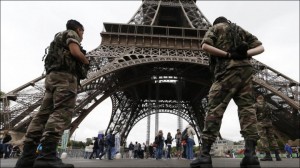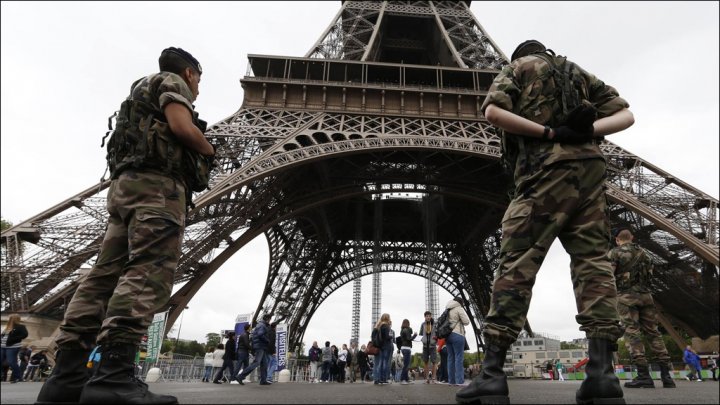 Europe must not duplicate the failed US strategies following the 9/11 attacks. Those strategies only created the conditions out of which violent extremism grew stronger. A well thought-out approach is important not only due to Europe’s geographic proximity to some of the world’s most violent conflicts, but also due to its ongoing complicity with the major drivers of the emergence and spread of terrorism.
Europe must not duplicate the failed US strategies following the 9/11 attacks. Those strategies only created the conditions out of which violent extremism grew stronger. A well thought-out approach is important not only due to Europe’s geographic proximity to some of the world’s most violent conflicts, but also due to its ongoing complicity with the major drivers of the emergence and spread of terrorism.
Friday’s heinous terrorist attack in Paris, a beacon of rationalism, culture, and enlightenment throughout modern history, which led to the death and injury of some 500 people, challenges Paris to maintain its political composure and take precautions against an irrational or frenzied response. It challenges France to reiterate its public rejection of the US response 14 years ago, when it launched a war to quench the desire to avenge the blood of innocents. History has shown that at that time Paris was right and Washington was wrong. In fact, the birth of ISIS itself is one of the most serious consequences of the former US president’s decision to go to war and invade Iraq. The least that can be done to honor the French victims, and the others who have died and are still dying every day elsewhere, is to make greater efforts to devise a strategy that recognizes the cause of the ongoing failures and secures appropriate conditions to end terrorism rather than stoke it and even entrench it in Europe.
In this context, France in particular must review the policies and practices that have increasingly fostered extremism and aided the recruitment of French Muslim citizens to terrorist organizations. Outside the Arab world, France is now this biggest supplier of foreign fighters in Syria. In turn, France must develop policies and practices that help to integrate its Muslim citizens and ameliorate their marginalization, without sacrificing its secular values or its fight against religious extremism. This may help to prevent the emergence of the first ISIS branch in Europe, though it will not be enough to eliminate the main organization.
The extraordinarily inhuman violence and cruelty of ISIS is the natural consequence of the decades-long interplay between millions of victims belonging to various religious and ethnic majorities and minorities in the Arab region and the inhumane brutality of the regimes of Saddam Hussein the Assads, both father and son, Nuri al-Maliki, and other Arab governments. It is the outcome of the interaction between the eliminationist, fascist, secular discourse adopted by these governments and their parties and Wahhabi, takfiri discourse spread every day by official religious institutions in other Arab states that claim to be fighting terrorism. It is the product of decades of systematic oppression in which numerous Arab states have not hesitated to use any means of individual and collective punishment, from chemical weapons to barrel bombs used against civilians, the rape of women and men, and torturing suspects, sometimes even on behalf of the American government. All of this has taken place with the short-sighted, opportunistic collusion of the international community, in pursuit of short-term gains through their dealings with the regimes of Saddam Hussein, the Assads, Qaddafi, Zein al-Abidine Ben Ali, Mubarak, and others, whether by engaging in proxy wars, or selling costly, unnecessary weapons to authoritarian regimes who use them against their own people. This has come at the expense of a long-term strategy that would help this ill-fated region, adjacent to Europe, become self-sustainable, prosperous, and stable. The millions of refugees knocking on Europe’s doors, the waves of irregular migrants landing on its coasts, and the terrorist attacks in its capitals are also the result of a deplorable, short-sighted European policy.
Most of the nations of Africa, Asia, and South America experienced a European colonialism no less brutal than that experienced in Arab countries. Whilst the colonial era has ended around the world it has not ended in Palestine. International humanitarian law and human rights law were born only to be buried in Palestine and other Arab countries. On the grave of these legal regimes, “inhuman” laws flourished in the Middle East and North Africa, upheld by past and present Arab governments, Israel, al-Qaeda, and now ISIS. Either the world must be capable of applying international law with the same standards on all parties, or the system of draconian laws will continue to reign, no matter how much security precautions and military arsenals are bolstered.
Maintaining the security of individuals, communities, and peoples is of the utmost importance at all times all over the world. But reducing security to police and military approaches will only have the same failed consequences of the post-9/11 strategy: the spread of even more terror and savagery. The betrayal of international humanitarian law and human rights law, the dominance of repressive laws in the Middle East and North Africa, the ongoing political and economic failure in many Middle Eastern states, rampant corruption, ignorance, hatred, and violent, religious extremism—the repercussions of all these ills have not and will not be confined to the region.
German Chancellor Angela Merkel adopted a positive and courageous stance on the Syrian refugee crisis, but it was one, isolated step without a clearly articulated vision. Europe is not required to “host” the peoples of the region. It should instead develop a comprehensive strategy that addresses the common roots of the current refugee crisis, terrorism, and political and economic failure while also preserving European values, to stop the Arab world’s transformation into a region that expels its peoples and a source of political and religious extremism and terrorism.
The UN must fundamentally reassess the way it operates to ensure that its resolutions and those of its human rights bodies are applied to all states without exception and to restore its moral authority in the world. The flourishing of terrorism and repressive laws in the Arab world mirrors the collapse of the UN’s moral status and international law in this region and the world.
Share this Post

